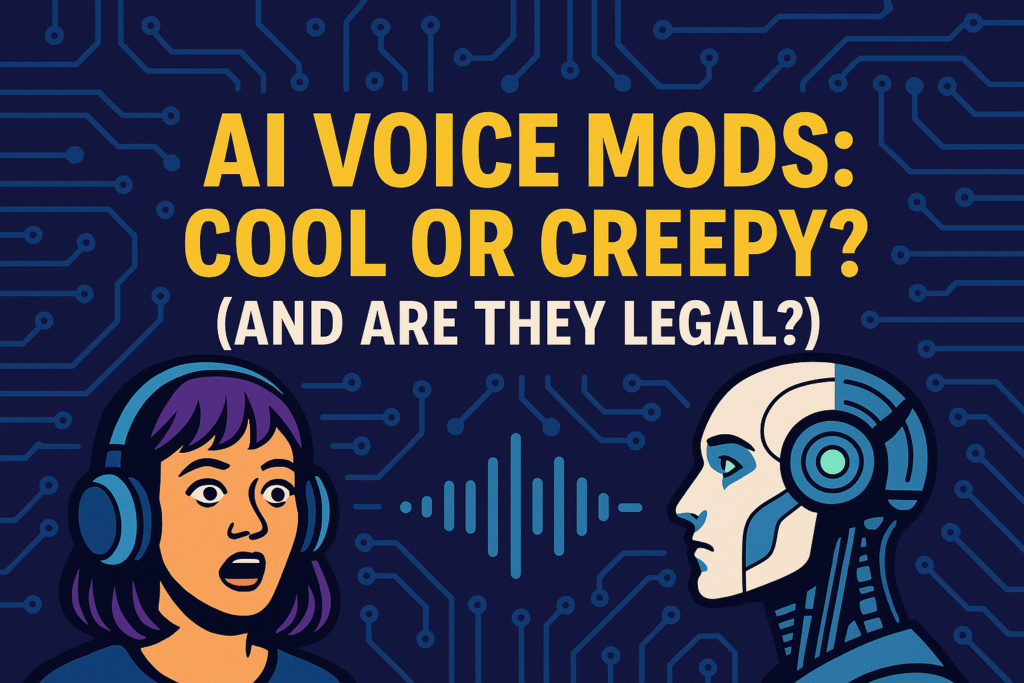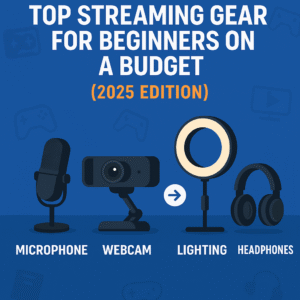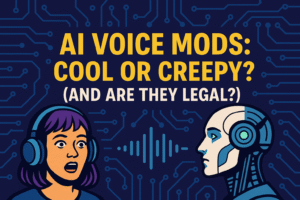In 2025, artificial intelligence is touching every part of our digital lives—including how we sound online. From gaming to streaming and even casual chats, AI-powered voice mods have surged in popularity. But with their rise comes an important question: Are they awesome tools for fun and creativity, or are they a little… creepy?
Let’s break down what AI voice mods are, how they’re being used, and most importantly—whether they’re legal or crossing ethical lines.
What Are AI Voice Mods?
AI voice mods (short for “modifiers”) use machine learning and voice synthesis to change, alter, or completely replace your voice in real time. Some software can:
-
Mimic celebrity or fictional character voices
-
Clone a person’s voice with a few audio samples
-
Change your pitch, tone, or accent
Popular tools like Voicemod, AI Suit Voice, iMyFone MagicMic, and open-source solutions using Tacotron, Descript, or Respeecher are at the centre of this trend.
Why Are Gamers and Streamers Using AI Voice Mods?
The gaming community, especially streamers and VTubers, has embraced AI voice mods for several creative reasons:
🎮 1. Entertainment Value
Imagine role-playing as Batman in GTA V or using a squeaky anime voice in Fortnite. It’s immersive and funny—and audiences love it.
🎭 2. Anonymity & Privacy
Many people prefer to remain anonymous online. AI voice mods help hide gender, age, or real identity—making it a tool for safety as well as fun.
🧠 3. Character Building
Streamers and VTubers use AI voices to match their virtual personas, enhancing immersion and creating full-blown characters with distinct sounds.
💼 4. Accessibility
People with speech difficulties or social anxiety may find comfort using AI-assisted voices to express themselves online.
Cool or Creepy? Pros and Cons of AI Voice Mods
Let’s look at the good, the bad, and the ethically murky side of AI voice modification.
✅ The Cool Side
-
Creative freedom for streamers, content creators, and modders
-
Roleplay enhancement in RPGs and voice-heavy games
-
Comedic potential in multiplayer lobbies and Discord calls
-
Inclusivity for users uncomfortable with their natural voices
❌ The Creepy (and Risky) Side
-
Mimicking real people can lead to deception or harassment
-
Deepfake voices used for scams, misinformation, or trolling
-
Unsettling interactions in games when voices don’t match the speaker
-
Impersonation risks that could break community or platform rules
As the line between real and artificial blurs, many users are starting to question what’s authentic and whether they’re interacting with a person—or a perfectly trained voice AI.
Legal Status: Are AI Voice Mods Allowed?
This is where things get tricky. In most countries, using AI voice mods isn’t illegal by itself, but how you use them could be.
📜 Legal When:
-
Used for entertainment and personal expression
-
The voice is not based on someone else without permission
-
Disclaimers are added during streaming/content
⚖️ Illegal or Risky When:
-
Cloning someone’s voice without consent (especially public figures)
-
Using the voice mod to defame, scam, or harass
-
Misleading audiences for profit (like using Morgan Freeman’s voice to narrate a fake trailer)
Some states in the U.S. are pushing new laws to regulate AI voice tech, especially around deepfake audio. Big tech platforms like YouTube and Twitch also have community guidelines that may flag or ban content using voice clones deceptively.
How to Use AI Voice Mods Safely (and Ethically)
If you want to join in on the trend, here’s how to keep it fun and respectful:
✅ Do:
-
Use fictional or licensed voices where usage is allowed
-
Create original characters with AI-enhanced voices
-
Add disclaimers if using AI-modified voice in content
-
Respect others’ boundaries during multiplayer interactions
❌ Don’t:
-
Use someone’s real voice without consent
-
Trick people into thinking you’re someone you’re not
-
Monetize impersonations of celebrities or creators
-
Use AI mods to harass or mock others
The key is transparency and creativity—not deception.
The Future of Voice in Gaming and Streaming
AI voice tech is only getting better. Soon, we might see:
-
Live translation with voice cloning (play in Japanese but sound like a native)
-
AI-generated character voices in RPG mods
-
Voice swapping in real-time podcasts or collaborations
-
Personal AI voice assistants that sound just like you
But with power comes responsibility. Just as face deepfakes have triggered huge debates on misinformation, voice deepfakes are under scrutiny too.
Final Thoughts: The Voice of the Future
AI voice mods are undeniably fascinating. For gamers and creators, they open up huge creative potential. But like any powerful tech, they come with a dark side if misused.
So are AI voice mods cool or creepy? The answer is—it depends on how you use them.
Used responsibly, they’re an exciting part of the evolving digital experience. Used recklessly, they can blur ethical lines and spark real-world problems.
In the end, it’s not the tool—it’s the intention. Be cool. Be kind. And most importantly, be real about what’s AI and what’s not.
Written by Gamink | July 2025
Covering the future of gaming, mods, and online culture.





